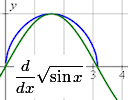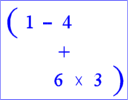IntMath Newsletter: Free resources, derivative from first principles
By Murray Bourne, 31 Mar 2011
30 Mar 2011
In this Newsletter:
1. Free resource: Study Tips from Cornell University
2. Have your say - how should math education be changed?
3. Free resource: Space Math @ NASA
4. Derivative of square root of sine x by first principles
5. GeoGebra is part of Google Summer of Code 2011
6. Lesson idea for order of operations
7. Final thought – enthusiasm
1. Free resource: Study Tips from Cornell University
Suitable for: Students
Work smart! Many students are very inefficient when they study. Here are some good bits of advice.
See all the resources here: Cornell University Study Skills Resources
2. Have your say - how should math education be changed?
Suitable for: Students and teachers
Here's an interesting opportunity and something interesting to do over the up-coming summer break.
Elev8ted was "a site for students to upload 2 - 3 minute videos that:
- Inspire others to transform eduation
- Offer new choices for what education could be
- Propose specific actions you or others can take to improve education in your community"
So what are your ideas on how can we improve math education? Students, here's your chance!
Update: Unfortunately, the site no longer exists.
3. Free resource: Space Math @ NASA
Suitable for: Students and teachers
So how is math used in the "real world"? Here's an institution for whom math is vital - NASA. There are articles about the recent earthquakes, tsunami and nuclear disaster in Japan.
 |
Do a search on "math" when you get there. You will find topics like: Black Hole Math | Earth Math | Image Scale Math | Lunar Math | Magnetic Math | Radiation Math | Solar Math | |
4. Derivative of square root of sine x by first principles
Suitable for: Students of calculus. Several readers asked how to differentiate trigonometric functions from first principles.
 |
Here's how to find the derivative of √(sin x) from first principles. |
5. GeoGebra is part of Google Summer of Code 2011
Suitable for: Students
 |
This is an interesting summer project - write some math-related software for Google! |
6. Lesson idea for order of operations
Suitable for: Teachers
 |
Here's a motivating way for students to learn order of arithmetic operations. |
7. Final thought – enthusiasm
Charles Kingsley (1819-1875), English clergyman and novelist, had this to say about enthusiasm.
We act as though comfort and luxury were the chief requirements of life, when all that we need to make us really happy is something to be enthusiastic about. [Charles Kingsley]
Enthusiasm for life, and math, certainly makes me happy!
Until next time, enjoy whatever you learn.
See the 11 Comments below.
1 Apr 2011 at 2:06 am [Comment permalink]
Good information.
If you would talk about number analysis
1 Apr 2011 at 7:56 am [Comment permalink]
Thank you NASA, thank you NASA (borrowed from "Dante's Peak). That site is a gold mind,and will be well expored. Thank you Murray Bourne!
1 Apr 2011 at 2:39 pm [Comment permalink]
Thank you very much sir,you are sending continuously these these articles.Which are precious and very informative for like us.I request you ,it is a time period gap is long,please send more articles in this period.
5 Apr 2011 at 12:51 am [Comment permalink]
Helo Mr. Bourne, I truly would like to thank you for the wonderful information that you have been producing in your Newsletter. You ask for inputs on " How should Math Education be changed?" I would like to see the math objectives for teaching Math in the schools, beginning with the "foundations of each objective, and this be made mandatory for the teachers. So many classrooms are walking through the objectives with computers, calculators, and worksheets. I am talking about putting these things away and teach the foundations, with notes being written manually, rules expressed, formulas explained for each lesson and drawings done, by the students. This should be enforced by the teachers ending in a Math notebook of foundation that will not change throughout the duration of Math and Geometry in their movement from one grade to the other, and different Math classes. This sounds lot a lot of work and it is, but to see the faces of kids that were dreading the fact of just "being in the class, change to a student really liking math and getting it," is a wonderful feeling. I am speaking as a Math teacher, (Middle School), that saw this transformation with my own eyes, kids that came in the class a (1) level, and finished at the end of the year a (4), and passing their EOG. I have since (2006) left the career to go back to school myself, I am in my last quarter of a four year university, doing a degree in Business Adminstration, some how this move has given me a deep drive to go back into teaching, knowing that the teaching of "Foundations" of each Math objective, was the best way to go. Your newsletter has given me some wonderful stuff, to add to my plans to try and make this a universal thing. Teachers!, you have got to be dedicated to the profession, to make this work. Thanks again.
Judy
5 Apr 2011 at 2:09 pm [Comment permalink]
Thanks a lot, Judy for the input!
11 Apr 2011 at 10:58 am [Comment permalink]
I have been receiving intmath newsletters for about 3 years. I am no longer formally studying math but I often need to refer back to my sixth form notes and your wonderful websites for my university courses.I really appreciate the service you provide. The occasional humour, interesting tidbits, and of course summer job opportunities are all well appreciated. Thank you Murray Bourne. Excellent service.
11 Apr 2011 at 8:47 pm [Comment permalink]
Glad it has been useful for you, Rebecca. All the best for your university studies.
12 Apr 2011 at 8:51 pm [Comment permalink]
I have been receiving inmath newsletter for some two years. i am a mathematics teacher at high school level but i face some difficulties in some problems.ur in math news letter is helping me . so i asked you to keep on sending the news letter. thank you for your effort in sharig your golden knowlege!
12 Apr 2011 at 9:53 pm [Comment permalink]
Happy to help, Amensis!
16 Apr 2011 at 1:32 pm [Comment permalink]
Your mathsis difficult to understand because you could not provide us with the sample and the proceedures on how to solve the problem.
16 Apr 2011 at 4:01 pm [Comment permalink]
Hi Benjamin. Which piece of math do you mean? Most readers find the explanations very easy to follow.